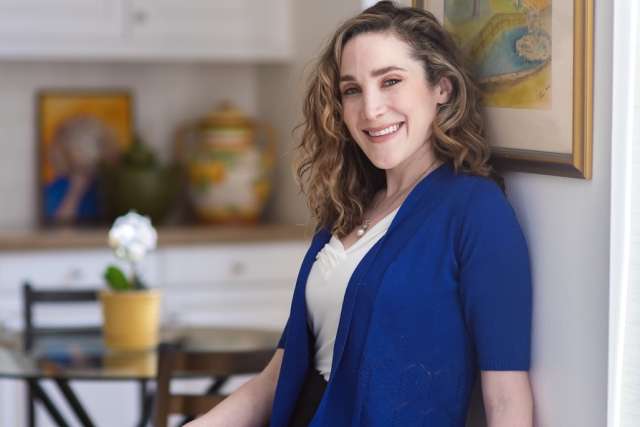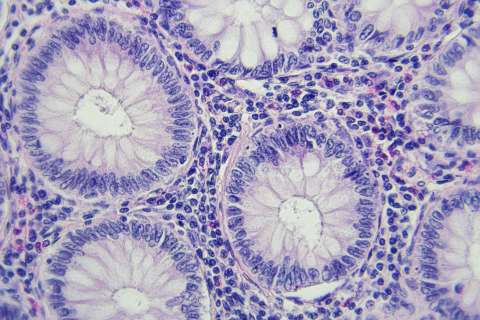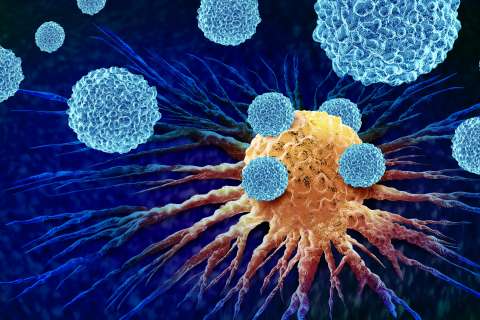It’s never too early to consider your legacy.
We tend to think of legacy as something that marks an ending — the end of our careers, the end of our lives.
But what if legacy is something to intentionally cultivate early on, so it might serve as a meaningful guide for the life we want to live and the impact we hope to have?
That’s the approach Sydney Siegel, LCSW, takes with the “Rippling Reflections” program she created for fourth-year students at the David Geffen School of Medicine at UCLA.
“Unlike the dictionary definition of legacy as looking back on the long-lasting impact of events in the past, it can also be about looking forward and really empowering students to have agency in shaping their legacy,” says Siegel, a licensed clinical social worker with the Simms/Mann-UCLA Center for Integrative Oncology. “They can bring real intention as to who they want to be, not only as a physician, but as a human with their own unique history and their own values.”
“Rippling Reflections” started in 2020 as a program for patients facing cancer diagnoses. Many felt overwhelmed and disempowered when asked to consider their legacy as a way to cope with the existential challenges of their diagnosis, Siegel says. They’d look back on their lives and see all the places they felt they’d come up short or failed to live up to their own expectations.
So Siegel devised an intervention to counteract this “legacy-related distress” for some, and to enhance a sense of legacy for others. Over a series of one-on-one meetings, she guided patients through a creative process that invited them to explore and define their life legacy in their own way.
Legacy is “conventionally centered around accomplishments, success and contributions to society,” Siegel says. “This program takes a different approach in trying to expand the idea of what legacy can be for somebody.”
The patient program was paused during the COVID-19 pandemic and is set to soon relaunch virtually, she says.
Legacy at the beginning of a medical career
Meanwhile, Richard Pietras, MD, PhD, a professor of medicine in the division of hematology/oncology, heard about “Rippling Reflections” and asked if a similar program might be made available to medical students.
Siegel was thrilled.
“I got very excited when he asked, because it had been on my mind — not just our patients’ legacies, but our legacy as providers,” she says. “And how we carry our patients’ legacies and their life stories and their experiences and their suffering and their grief and their trauma, and the ripples of impact that we make on them and that they make on us.”
So in 2022, Siegel developed “Rippling Reflections” for medical students ready to begin residency. She meets with each student individually, leading them through a two-hour process that includes visualization, music, an exploration of their values and creative expression.
Student testimonials show an overwhelmingly positive response.
“It enriched my life,” said one recent participant.
“This session was an insightful experience that allowed me to face my potential future self in the mirror and examine the qualities that he has, so that I can work towards that vision,” the student said. “This experience also awarded me more empathy for my patients, highlighting how significant my role is in their lives, and the ripple effects that the way I communicate has.”
The legacy-development process goes beyond what Siegel describes as “resume-type goals” and delves more into the human side of medical work. Some of the questions they explore include: What kind of person do I want to be in this field? What kind of role do I want to play in patients’ lives? How do I want to make patients feel?
“It’s really focusing on their central values as a human and how we can integrate those values into their career,” Siegel says.
Taking a whole-person perspective
Just as the Simms/Mann Center embraces whole-person care, this is a whole-person approach to becoming a physician, she says.
“This program uses experiential exercises to focus more on the internal experience of being a provider when caring for a fellow human and it really empowers students to see their patients as full human beings in a way that feels truly genuine and aligned with their values,” says Siegel.
“It’s a way to give students the space to explore some of those really complex emotional experiences of working in health care and witnessing so much suffering and grief and how our patients’ experiences sometimes blend with our own stories of loss and hardship,” she says. “The hope is that we can add layers of richness and fulfillment to their experience as students and physicians through contemplation of their physician legacy.”
One recent participant called the experience “perhaps the best two hours I’ve spent so far in my fourth year of medical school.”
“What you’re doing is extremely important, as many people in medicine are in real need of inner healing,” the student continued. “Providing that in a safe, nonjudgmental and creative way not only impacts physicians and trainees, but also their patients for years to come.”
Bringing creative ideas to life
From the time she started working at the Simms/Mann Center in 2018, Siegel wanted to incorporate the arts and creativity into her care for patients. Before becoming a social worker, she worked in the film industry, where she saw how many filmmakers processed their grief and trauma through storytelling on screen.
She started thinking about how to bring that kind of healing to other populations.
With “Rippling Reflections” for both patients and physicians, Siegel incorporates writing, drawing, music and imagination to help participants uncover their motivations, concerns and desires as they clarify their legacy. It’s an exploration of identity and purpose.
For most of the student participants, it’s the first time in more than a decade of rigorous academics that they’ve been invited to pause and consider the purpose behind their hard work.
“The idea is that the session is the very first of many reflections about legacy throughout their career,” Siegel says. “And they can keep checking in, coming back, adding to their legacy and editing it — accepting that they’re going to make mistakes and have setbacks but knowing that they can always come back to their core values and these exercises to help guide them like their North Star.”
Said one participant: “This was truly fantastic and I believe all medical students should have such an experience.”
Siegel will continue to offer the program individually and hopes to develop a group approach to reach more students. And she’s profoundly grateful for the support she’s received from her colleagues at the Simms/Mann Center to create something that fulfills her mission of combining art and healing.
“I was so, so fortunate to land at Simms/Mann, because I don’t think I could have found any other program in the country that would have just welcomed my ideas with such open arms,” she says. “They’ve given me such unwavering support and mentorship to help me bring some of these more unconventional and creative ideas to life.”




